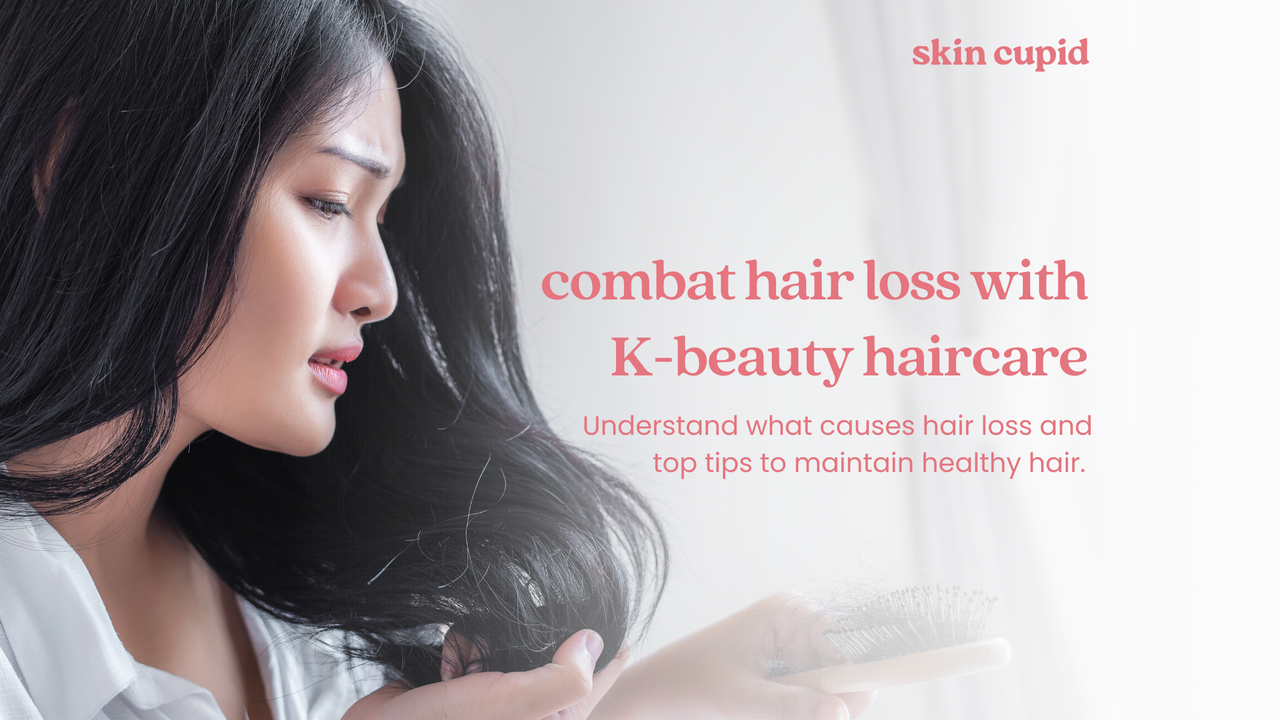Your bag is empty
Posted: 11 June 2024
4 Minute ReadCombat Hair Loss with K-beauty: Causes and Proven Methods
Hair loss doesn't play favorites; it can happen to anyone! Let's explore the common causes of this condition and some effective home care methods.
Combat Hair Loss with K-beauty: Causes and Proven Methods
Noticing a little too much hair in your shower drain? Hair loss affects many of us, whether it's genetics or your daily habits to blame. Let’s uncover the mystery behind those missing strands and learn how to combat hair loss with some handy home tips!
Am I Losing Hair?
Signs of hair loss vary from person to person, and it often takes time to notice as hair is lost gradually day by day. If you observe hair thinning, a slowly growing bald spot, a receding hairline, a widening part, or a thinner ponytail, you might be experiencing hair loss. While for many people hair loss becomes noticeable over time, some may experience a sudden loss of hair within 1-2 days or after just one brushing, resulting in clumps of hair falling out. Hair loss can also affect other parts of the body, such as eyebrows, eyelashes, and beards, not just the scalp.
Myth Debrunk: Only Men Experience Hair Loss?
Fact check - it’s false! Anyone can experience hair loss, regardless of gender. However, some studies show that men seem to be more prone to hair loss, primarily due to genetics and hormonal factors. Men have higher levels of androgens, especially dihydrotestosterone (DHT), which is a derivative of testosterone. DHT binds to hair follicles and causes them to shrink, leading to thinner hair and eventually hair loss.
Causes of Hair Loss
Hair loss can be caused by several factors, including genetics, hormonal changes, age, and lifestyle. Let’s break them down to get to know more:
Genetics
Hereditary hair loss, known medically as androgenic alopecia, is triggered by inheriting genes that cause hair follicles to shrink, eventually ceasing hair growth altogether. This often manifests as thinning hair or a wider part for women, and a receding hairline or bald spot at the crown for men. While some may notice these signs during their teenage years, for most people, they become apparent later in life.
Hormonal Changes
Hair shedding post-pregnancy is attributed to fluctuating estrogen levels, which surge during pregnancy and stimulate hair growth. After childbirth, hormone levels decrease, causing the excess hair grown during pregnancy to shed. Also, stress-induced hair loss is more prevalent in women compared to men - prolonged stress elevates cortisol (stress hormone) levels, impacting the formation and premature breakdown of hair follicles.
Age
As we get older, our hair growth slows down, resulting in thinner and less dense hair on the scalp. This occurs because ageing can lead to hormonal changes and reduced blood circulation to the scalp, causing the hair follicles to gradually shrink.
Lifestyle
Your everyday routines greatly affect your hair's well-being! Eating a balanced diet and getting enough sleep helps maintain hormonal balance, which is crucial for healthy hair growth. However, if you frequently change your hairstyle, keep in mind that pulling on your hair and frequent dyeing/bleaching can harm hair follicles and contribute to shedding.
Can Home Care Stop Hair Loss?
While home care can certainly help improve the overall health and appearance of your hair, it may not be able to completely stop hair loss, especially if it's caused by genetic factors or underlying medical conditions. It's essential to remember that individual results may vary, and for severe or persistent hair loss, consulting a healthcare professional is recommended to explore additional treatment options.
Home Care for Healthy Hair
Use A Gentle Shampoo
Harsh chemicals are a big no-no for hair growth, so let’s opt for a gentle yet effective shampoo that purifies the scalp and maintains a clean foundation for hair. Remember, even if you choose the right shampoo, excessive washing isn't great for hair growth. Although there might be some differences depending on individuals, it's usually recommended to wash your hair around every 2-3 times a week.
Try: KUNDAL Caffeine Scalp Shampoo Cherry Blossom (500ml) - £15.99
Discover the clinically proven formula of KUNDAL, designed to maintain a healthy scalp and hair elasticity. Infused with Caffeine, Panthenol, and Salicylic Acid, this shampoo enhances blood circulation, and boosts scalp moisture, while preventing dryness and dandruff.
Incorporate Scalp Massage (1-2 times a day)
Research suggests that scalp massage can help thicken hair and stimulate hair growth by boosting blood circulation in the scalp. Simply use your fingertips to gently massage the entire scalp for 10 to 15 minutes, using circular motions. For added benefits, consider applying a scalp tonic before massaging to nourish and hydrate the scalp further.
Try: KUNDAL Head Spa & Scalp Care+ Scalp Tonic (100ml) - £13.99
This tonic is crafted to enhance blood circulation in the scalp, providing a luxurious spa-like treatment for healthier hair. Infused with Salicylic Acid to exfoliate and cleanse the scalp, along with soothing Tea Tree Oil, it helps maintain a clean, healthy scalp environment conducive to hair growth.
Avoid Tight Hair Styles
Healthy Diet and Stress Management
To keep hormone levels balanced, focus on eating nutrient-rich foods packed with vitamins, proteins, and minerals. If maintaining a healthy diet daily is challenging, consider taking supplements as an alternative. Since stress can negatively impact hair growth (and your skin too!), it's beneficial to incorporate stress-relief activities into your routine, such as meditation and exercise.





 Subscription box
Subscription box 






















